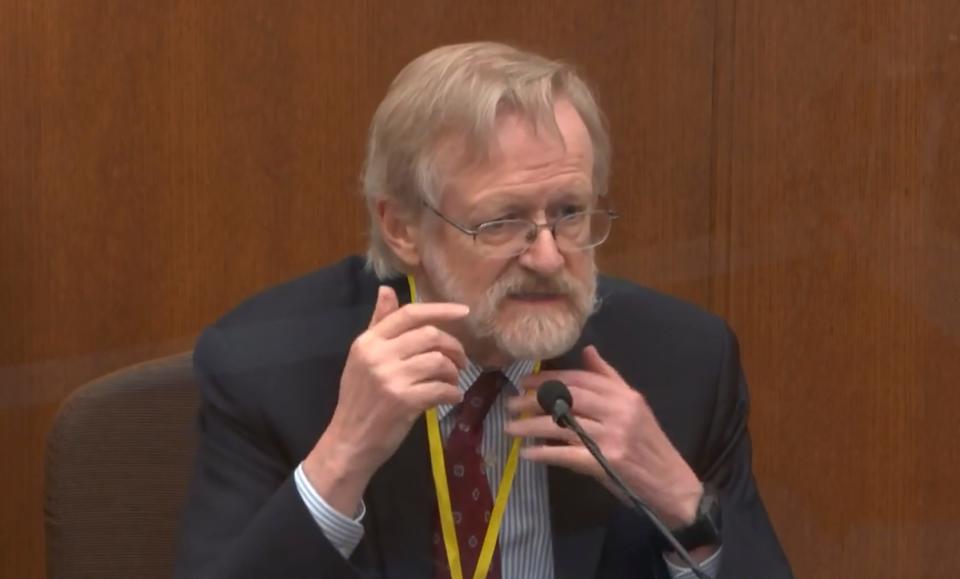'Nothing makes sense'
- Oops!Something went wrong.Please try again later.
Five people were shot and killed by a former NFL player who took his own life. A breathing expert testified "what George Floyd was subjected to" would kill a healthy person. And hold onto your seats, hurricane season is coming. The predictions: Stormy.
👋 I'm Laura. You're you. And this is the news you need to know.
But first, this sounds like ghosts: Police in Cincinnati have been looking all over a cemetery after monkeys were reported swinging from trees there. Monkeys have yet to be found. 👻🐒.
The Short List is a snappy USA TODAY news roundup. Subscribe here!
'Nothing makes sense'
Police in Rock Hill, South Carolina, are searching for answers after they said former NFL player Phillip Adams shot six people – leaving five dead and one injured – before taking his life at his parents' nearby home. The victims have been identified as Dr. Robert Lesslie, 70; his wife, Barbara, 69; their grandchildren Adah, 9, and Noah, 5; and James Lewis, 38, who was an HVAC technician working at the home. Another technician, Robert Shook, was working with Lewis and was hospitalized with gunshot wounds in critical condition. "There's nothing about this right now that makes sense to any of us," York County Sheriff Kevin Tolson said Thursday. "Dr. Lesslie was a pillar in this community with what he's been able to give back," he said. Having bounced around the NFL as a journeyman cornerback, Adams, 33, played six seasons in the NFL, from 2010-15, for six different teams.
Breaking down Phillip Adams' NFL career: "I think the football messed him up," his father says.
What we know: Dr. Leslie and family among those killed in South Carolina shooting.

Biden: No more 'ghost guns'
Thursday, President Joe Biden unveiled his first major steps to address gun violence, directing his administration to tighten restrictions on so-called ghost guns.
First of all, what is a ghost gun? It's essentially an untraceable gun that can be constructed from parts purchased online. Here's what you need to know.
Biden has come under immense pressure in recent weeks from gun safety advocacy groups and Democrats to fulfill his campaign pledge to tackle gun control. "Gun violence in this country is an epidemic," he said at the White House, calling it an "international embarrassment. The idea that we have so many people dying every single day from gun violence in America is a blemish on our character as a nation." The president announced his nomination of ATF veteran David Chipman as the director of the Justice Department's Bureau of Alcohol, Tobacco, Firearms and Explosives.
What everyone’s talking about
Khloe Kardashian didn't want the world to see that photo. She addresses the pressure to look perfect.
A man broke COVID-19 curfew – then died after being forced to do 300 squats as punishment.
After thousands of pet owners reported harm, a watchdog group petitioned the EPA to ban the Seresto flea and tick collar.
Best Buy Beta: The big blue box of electronics pilots a membership program to take on Amazon.
Thousands of meatpacking workers have been vaccinated. But the crisis in the industry continues.
North Carolina paid a man for 15 years of wrongful imprisonment, even though he was in prison for 44 years.
Spoilers! How "The Goldbergs" will say goodbye to George Segal, the series' beloved Pops, in his final episode.
Breathing expert testifies in Chauvin trial
The effect of being restrained on George Floyd's left lung was "as if a surgeon had gone in and removed the lung," according to Dr. Martin Tobin, who testified in court during Derek Chauvin's murder trial that the cause of Floyd's death was hypoxia, or a low level of oxygen, that led to asphyxia, or suffocation. Addressing arguments from the defense that Floyd died because of his poor health and drug use, Tobin, who has worked in respiratory physiology since 1981, said Floyd's breathing wasn't affected by fentanyl in his system or underlying health issues, and even a healthy person "would have died as a result of what he was subjected to." Chauvin, a former Minneapolis police officer, is charged with second-degree murder, third-degree murder and second-degree manslaughter in Floyd's death.

So. Many. Hurricanes.
After a 2020 hurricane season that might as well have ripped up the record books and thrown them into the sea, top forecasters at Colorado State University said Thursday that we should expect yet another active, above-normal season this year. Hurricane season starts June 1, and meteorologists predict that from then until Nov. 30, the end of the season, 17 named tropical storms will form, eight of which will become hurricanes. Forecasters will update their predictions three times over the next few months. The first named storm of the Atlantic hurricane season will be Ana.
🌩 Last year, there were a whopping 30 named storms, 13 of which were hurricanes. That's way above an average season, which typically has 12 tropical storms, six hurricanes. (And that, dear Short List reader, is why, after 30-something years, I moved from Florida to Colorado this year.)

Real quick
💅 It's the end of an era. A Texas woman with 24-foot nails has cut them off.
Navy destroyer USS Johnston, sunk during WWII in 1944, found after "deepest wreck dive in history."
Umpin' ain't easy: MLB Umpire Angel Hernandez blew so many calls in the Astros-Angels game.
The clue is: Mayim Bialik, Anderson Cooper and Bill Whitaker. Answer: "Who are the next 'Jeopardy!' guest hosts?" 🥳 Here's when they'll appear.
Panic buying? Not anymore. Suddenly there's a surplus of hand sanitizer.
Witnesses: A brawl outside NFL player Travis Rudolph's home preceded the fatal shooting.
COVID-19 and its disturbing aftermath
Not the news we needed: For a person who survives COVID-19, there is a 1 in 3 chance of being diagnosed with a neurological or psychiatric condition within six months, according to a massive study on more than 230,000 electronic health records of COVID-19 patients. Thirty-four percent of survivors were diagnosed with at least one of these conditions, and for 13% of these people, it was their first recorded neurological or psychiatric diagnosis. Mental health diagnoses were most common among patients: 17% were diagnosed with anxiety, and 14% were diagnosed with a mood disorder. It is, of course, possible these psychiatric disorders could stem from the stresses of the pandemic itself, but even so, the study is an important first step in what clinicians can expect from their patients who have recovered from COVID-19.
👉 Latest COVID-19 updates: A Colorado mass vaccination site shut down after 11 "adverse reactions" to J&J shots.
📈 Today's numbers: The USA has more than 30.9 million confirmed coronavirus cases and almost 560,000 deaths, according to Johns Hopkins University data. At least 225.2 million vaccine doses have been distributed in the USA, and 171.4 million have been administered, according to the CDC.
A break from the news
😎 Would you miss your kid's birth to play music with John Lennon? Cheap Trick's Rick Nielsen did. Let's just say it's a good thing it wasn't Paul.
🌄 Grand Canyon's east entrance will soon reopen after a yearlong closure. Here's what to know if you go. Plz send a postcard.
🎶 New Prince music! Posthumous single drops ahead of previously unreleased "Welcome 2 America" album.
This is a compilation of stories from across the USA TODAY Network. Want this news roundup in your inbox every night? Sign up for The Short List newsletter here.
This article originally appeared on USA TODAY: South Carolina shooting, Derek Chauvin murder trial, hurricane season, COVID-19: Thursday's news.

